


 6:38:7
6:38:7  2019-02-09
2019-02-09  1271
1271

New research suggests a significant link between the health of the gut and its bacterial population and mental health. For the first time, scientists have explored this link in humans. They identified some of the possible culprits.
Researchers are now showing that the bacteria populating our guts affect many different aspects of our health.
This includes mental health as well as physical health.
A study covered by Medical News Today found a persistent link between bacterial diversity in the gut and mental health issues.
Now, researchers from VIB-KU Leuven Center for Microbiology in Belgium have analyzed the health data of a large group of people to pinpoint which gut bacteria may play a role in depression.
The new study — the findings of which appear in the journal Nature Microbiology — not only puts a name to these probable bacterial culprits, but it also shows that many bacteria can produce substances that interact with the nervous system. These are called neuroactive.
Microbial diversity may have a say
The researchers analyzed fecal microbiome data in conjunction with diagnoses of depression in 1,054 people taking part in the Flemish Gut Flora Project.
Through this analysis, the team revealed that two types of bacteria — those from the genera Coprococcus and Dialister — were absent from the guts of people with a diagnosis of depression. This even applied to those who took antidepressant medication.
The scientists confirmed the findings in two other cohorts: 1,063 people enrolled in LifeLinesDEEP, which collects data on the gut microbiota, and a group of individuals treated for clinical depression at the University Hospitals Leuven.
"The relationship between gut microbial metabolism and mental health," says study co-author Prof. Jeroen Raes, "is a controversial topic in microbiome research."
"The notion that microbial metabolites can interact with our brain — and thus behavior and feelings — is intriguing, but gut microbiome-brain communication has mostly been explored in animal models, with human research lagging behind."
"In our population-level study we identified several groups of bacteria that co-varied with human depression and quality of life across populations." – Prof. Jeroen Raes
In previous research, Prof. Raes and team had already revealed that a specific bacterial community (enterotype) with poor microbial diversity appeared more often in the case of people with Crohn's disease, a type of inflammatory bowel disease.
In this study, the team noticed that a similar enterotype is characteristic of people with a diagnosis of depression and who have a poorer quality of life.
"This finding," adds Prof. Raes, "adds more evidence pointing to the potentially dysbiotic nature of the Bacteroides2 enterotype we identified earlier. Apparently, microbial communities that can be linked to intestinal inflammation and reduced well-being share a set of common features."
Bacteria speak to the nervous system
The team also devised a special technique that allowed it to find out which bacteria might influence the nervous system.
They looked at over 500 human gut bacteria, focusing on whether they could produce neuroactive compounds. In the end, the team came up with a list characterizing the range of neuroactivity of different bacteria.
"Many neuroactive compounds are produced in the human gut," explains study co-author Mireia Valles-Colomer, adding, "We wanted to see which gut microbes could participate in producing, degrading, or modifying these molecules."
Valles-Colomer notes that the compounds released by certain gut bacteria appear to actively influence mental well-being.
"Our toolbox not only allows [us] to identify the different bacteria that could play a role in mental health conditions, but also the mechanisms potentially involved in this interaction with the host," says Valles-Colomer.
"For example," she explains, "we found that the ability of microorganisms to produce DOPAC, a metabolite of the human neurotransmitter dopamine, was associated with better mental quality of life."
In the future, Prof. Raes and colleagues aim to confirm these results through further experiments. They are already preparing to analyze forthcoming samples collected via the Flemish Gut Flora Project.
By Maria Cohut, Medical News Today
Reality Of Islam |
|

MXenes are

A newly dev

Get ready f

Researchers
 9:3:43
9:3:43
 2018-11-05
2018-11-05
10 benefits of Marriage in Islam
 7:5:22
7:5:22
 2019-04-08
2019-04-08
benefits of reciting surat yunus, hud &
 9:45:7
9:45:7
 2018-12-24
2018-12-24
advantages & disadvantages of divorce
 11:35:12
11:35:12
 2018-06-10
2018-06-10
 6:0:51
6:0:51
 2018-10-16
2018-10-16
 8:15:37
8:15:37
 2023-02-16
2023-02-16
 3:18:29
3:18:29
 2022-12-24
2022-12-24
 5:57:34
5:57:34
 2023-03-18
2023-03-18
 11:2:27
11:2:27
 2022-10-06
2022-10-06
a hero waters thirsty wild animals
 9:4:9
9:4:9
 2022-01-06
2022-01-06
 7:59:14
7:59:14
 2018-06-21
2018-06-21
 2:2:13
2:2:13
 2022-10-08
2022-10-08
 5:41:46
5:41:46
 2023-03-18
2023-03-18
| LATEST |